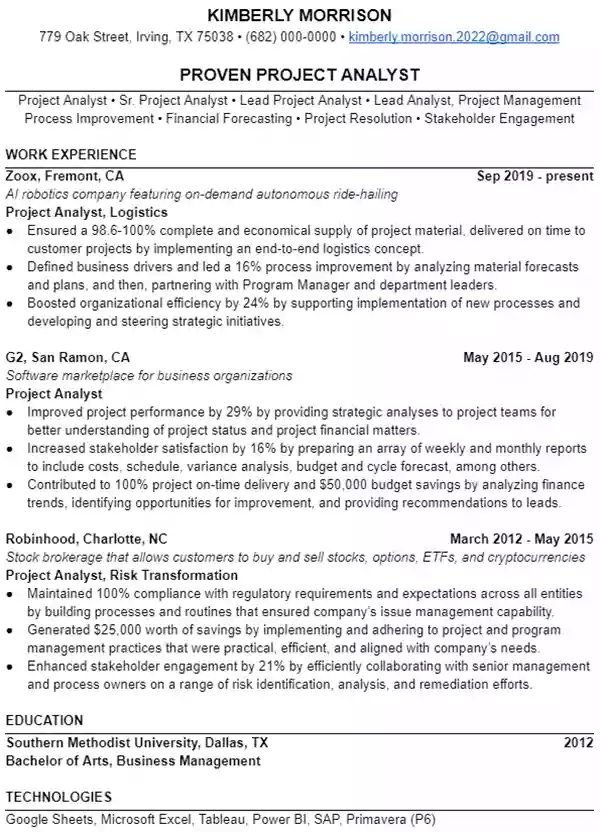Project Analyst Resume Example
A guide and template to write a Project Analyst resume that gets more interviews and job offers. Or have Leet Resumes write your resume for free.


How to Write a Project Analyst Resume that Gets Interviews
So you’ve taken the data, distilled it down into understandable metrics and it’s come down to this: How to Write a Project Analyst Resume.
No judgment here. As an analyst no data surprises you anymore, you’re just here to give whatever valuable information you have to the project manager to keep the project on track.
Maybe you thought writing and sending your resume would be more of the same, but it’s a little different from the standard charts and data visualizations you’re used to.
Fortunately, you’re in the right place.
In this article, we’ll show you how to apply your immaculate organization of facts, attention to detail and objectivity to create a Project Analyst resume that gets you more interviews and more job offers, too.
Here’s what you’ll find:
- A resume template that can be customized for every job you apply for (a tactic we highly recommend)
- A resume example to visually reference along the way to ensure the proper formatting and find more Project Analyst examples
- Expert resume tips along the way so your resume stands out from the crowd and lands more interviews
Wish someone else could write your resume?
Leet Resumes can do that, too. They’ll write a custom Project Analyst resume for you so you don’t have any of the hassle. Best of all, they’ll do it for free (seriously!). (Tips are always appreciated.)
How to Format a Project Analyst Resume
While there are no cells or axes to organize the data of your career into a systematic grid, there is a statistical standard to your resume that will deliver the results you’re used to. Here are the five sections of your Project Analyst resume:
- Professional Headline
- Summary
- Work Experience
- Education
- Keywords
Once these sections are populated, you’ll have an effective career report just like the resume example above. It takes just a few tweaks to tailor this resume template for you targeted analyst positions and get those interviews.
Let’s jump right in.
Name + Contact
Before anything else, type your name: first and last name at the very top of the page in a slightly larger font than the rest.
This is your calling card – you want to make it exceptionally clear who to call back for an interview.
Directly underneath, add your contact information: phone number, email address and location (city and address are all you need) and the first section of your resume is complete.
Straightforward and professional is best when it comes to your resume. This includes your email address – be sure to use an email you check regularly and aren’t embarrassed to spell out to your potential employer and project manager.
Professional Headline
Next is the professional headline. If your skills as a Project Analyst existed on a billboard, your professional headline would be the tagline that sums up who you are and what you do.
The simple formula for a great professional headline = positive adjective + level of experience + official job title.
In other words: Strategic Senior Project Analyst
Or: Diligent Assistant Project Analyst
Here are some other adjectives to get you started: dedicated, professional, innovative or team-oriented.
Professional Summary
Once you’ve drawn them in with a three to five word headline, it’s time to give a little more context in your professional summary. This follows a tried and true formula, too, and it looks like this:
Line One: list all the job titles you’d accept for your next position.
This probably includes, “Project Analyst,” but it can also include jobs that are adjacent to yours that you’re qualified for and interested in, like: Project Data Manager, or Research Operations Coordinator. Whatever you include, be sure to add the exact job title for the job you’re applying for.
Line Two: list the skills, attributes and capabilities that qualify you for these roles (specifically, the role you’re applying for).
You have one line to list the most relevant skills for the job you’re applying for. If the job is for logistics and warehouse support, your administrative or marketing-specific skills can be saved for later in your resume. Instead, focus on your familiarity with US Customs, international systems and logistics solutions along with the steadfast skills of project analysis, like: Microsoft 365 proficiency, FP&A experience and statistical analysis.
Line Three: an optional line to list your achievements or highlights of your work experience (if you’re newer to the industry, don’t worry about including this).
Line Four: another optional line for your career highlights, promotions and awards.
If you’re stuck at lines one and two, don’t worry about it. There’s no causal relationship between supplying more lines in your professional summary and receiving interview requests. Two strong and targeted lines skews more positively than four lines of you reaching for more data.
Need a break?
Without any additional effort you can have a document as complete and customized as the resume example above. Have Leet Resumes write your resume for free to see for yourself (tips are always appreciated).
Work Experience
Your work experience displays the history of your Project Analyst career over time: a flow series laid out in reverse chronological order.
Start by listing your previous work experience with the most recent position first. With each position include your specific job title, dates of employment and previous employer. (It feels redundant to tell a Project Analyst this, but 100% accuracy is required here.)
Next, add a bullet point list of the ways your analysis made each project successful. Here’s how:
Start with a strong success verb
Each bulleted entry should start with a success verb that implies the success of the project before you even get into the data.
These are words like generated, produced, advanced or converted. Each of these words propels each project forward and replaces passive verbs like oversaw, was responsible for or was hired to.
Paint the impact of your project analysis with a strong success verb for every point you include.
Add quantitative data (numbers)
You know what your job includes, but don’t assume your recruiter does. Instead of using this space to list the day to day responsibilities of your work, show the results of your work by including as many numbers as possible.
Numbers are specific. They help any reader of your resume – from an HR recruiter to a senior project manager – to immediately see how much of an impact your project analysis brings.
You can find numbers in the amount of reports you generated, how many departments you worked with or the scope of your analyses.
Once you feel like you’ve added enough metrics to your work experience, go back and double the number again. Every number brings you that much closer to landing an interview.
Include each promotion
Every promotion you’ve received is a powerful projection for your future employer. It indicates that you’re likely to repeat promotion-worthy work in the future and that that kind of work breeds success for the company.
Be sure to include every promotion you’ve received to highlight the relative frequency of your analysis.
With these three tips for your resume template, your bulleted list might read something like:
- Designed data migration assessments to optimize performance by 23% and increase speeds by an average of 13%.
- Generated 250+ project analysis reports for 8 departments.
- Boosted revenue by 2.5% by diagnosing website performance bugs and finding more efficient solutions.
- Achieved Lead Analyst title after 6 months of employment, conducting weekly analysis reports for executive objectives.
Education
Once you’ve outlined the highlights of your career, your education section will provide more context to the background that influenced that success.
Referring to the resume example above, list where you went to school, the dates of your attendance, the degrees you graduated with and any honors or awards you received.
Extracurriculars and incomplete degrees can be left off entirely. There’s no need to introduce distracting data that dilutes your most important accomplishments.
Keep this section brief and to the point.
Keywords and Skills for a Project Analyst Resume
In the final section of your resume template, you’ll list the keywords and skills that make you the best Project Analyst for the open position.
Remember, you are crafting a resume template that can (and should) be customized for each job you apply to. Consider the specific role and industry to find relevant keywords to include here. Here are some ideas to get you started:
Core Project Analyst Skills:
- Data Analysis
- Exceptional Research Skills
- Data Collection
- Survey Design
- Data Visualization
- Problem-Solving
Interpersonal Skills:
- Collaborative
- Team-Minded
- Excellent Communication
- Leadership
Technology Skills:
- Microsoft 365
- SQL (MySQL, MSSQL, etc.)
- Crystal Reports
- Tableau
- Python/R/Data Modeling
Once your targeted skills are listed, your resume is complete!
Can someone write my resume for me?
Yes! The experts behind this resume example and guide can craft a custom Project Analyst resume for you, for free. (Tips for a job well done are much appreciated.)










